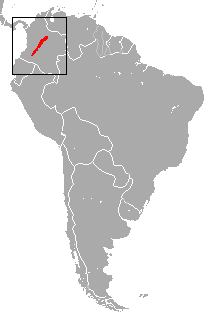Thomas's small-eared shrew facts for kids
Quick facts for kids Thomas's small-eared shrew |
|
|---|---|
| Conservation status | |
| Scientific classification | |
| Genus: |
Cryptotis
|
| Species: |
thomasi
|
 |
|
| Thomas's small-eared shrew range | |
The Thomas's small-eared shrew (Cryptotis thomasi) is a tiny mammal. It belongs to the family Soricidae, which includes all shrews. This small creature lives in parts of South America. You can find it in countries like Colombia, Ecuador, and Peru.
Contents
What is a Shrew?
Shrews are very small, mouse-like mammals. However, they are not rodents. They are actually more closely related to moles. Shrews have long snouts and tiny eyes. They also have very small ears, which is why the Thomas's shrew is called "small-eared."
Size and Appearance
Thomas's small-eared shrews are quite tiny. They usually measure only a few inches long. Their fur is often dark, like brown or black. They have soft fur that helps them stay warm. Their small size helps them move through dense plants.
Where They Live
These shrews live in specific areas. They prefer forests and mountainous regions. In Colombia, Ecuador, and Peru, they can be found in cloud forests. These forests are often covered in mist and have lots of plants. Shrews like places with plenty of leaf litter. This litter gives them good cover and places to find food.
What Do Shrews Eat?
Shrews are mostly insectivores. This means they eat insects. They have a very fast metabolism. This means their bodies burn energy quickly. Because of this, shrews need to eat almost constantly.
Their Diet
Thomas's small-eared shrews hunt for small creatures. Their diet includes insects like beetles and worms. They also eat spiders and other tiny invertebrates. They use their long, sensitive snouts to sniff out food. They are active hunters, always looking for their next meal.
Life Cycle and Habits
Shrews are usually solitary animals. This means they live alone. They are active both day and night. They spend a lot of time searching for food.
Reproduction
Shrews typically have several litters of babies each year. A litter is a group of young animals born at the same time. The mother shrew builds a nest for her young. The babies grow very quickly. They are ready to leave the nest in just a few weeks. Shrews generally have a short lifespan. They often live for only about one to two years in the wild.
Importance in Nature
Even though they are small, shrews play an important role. They help control insect populations. By eating many insects, they keep the ecosystem balanced. They are also a food source for larger animals. Predators like owls, snakes, and small carnivores hunt shrews.
Conservation Status
The Thomas's small-eared shrew is currently listed as "Least Concern." This means it is not in immediate danger of extinction. However, like many animals, their habitats can be threatened. Things like deforestation can reduce the places where they live. Protecting their forest homes is important for their future.
See also
 In Spanish: Cryptotis thomasi para niños
In Spanish: Cryptotis thomasi para niños
 | Calvin Brent |
 | Walter T. Bailey |
 | Martha Cassell Thompson |
 | Alberta Jeannette Cassell |


